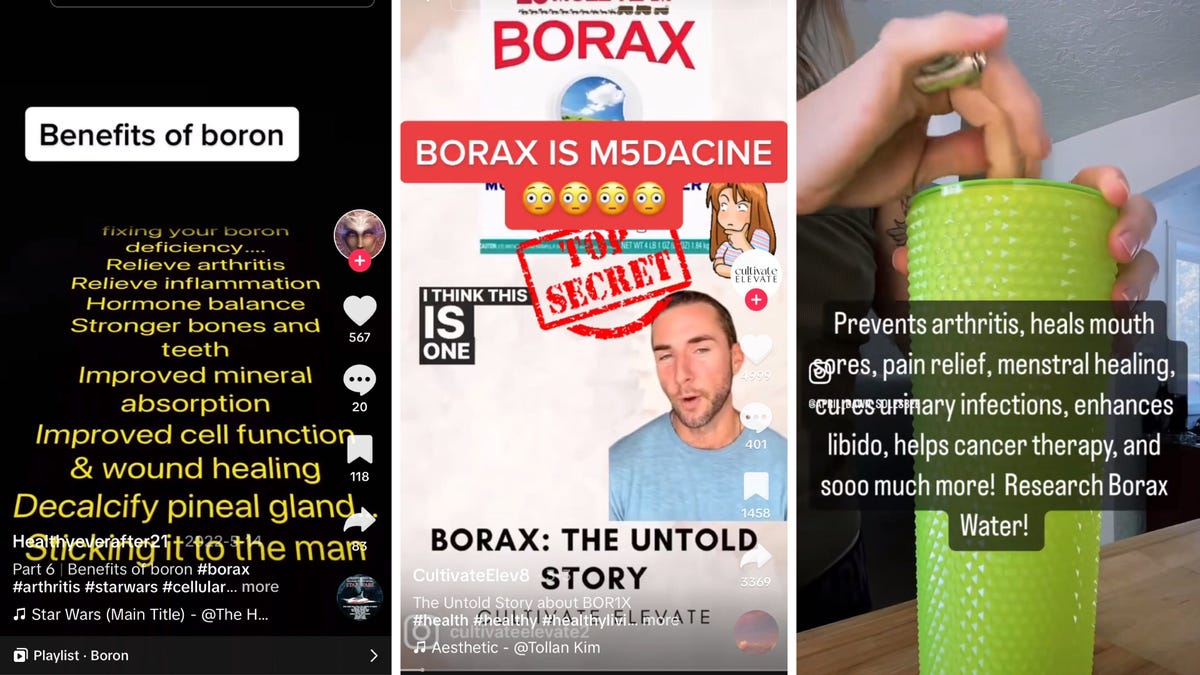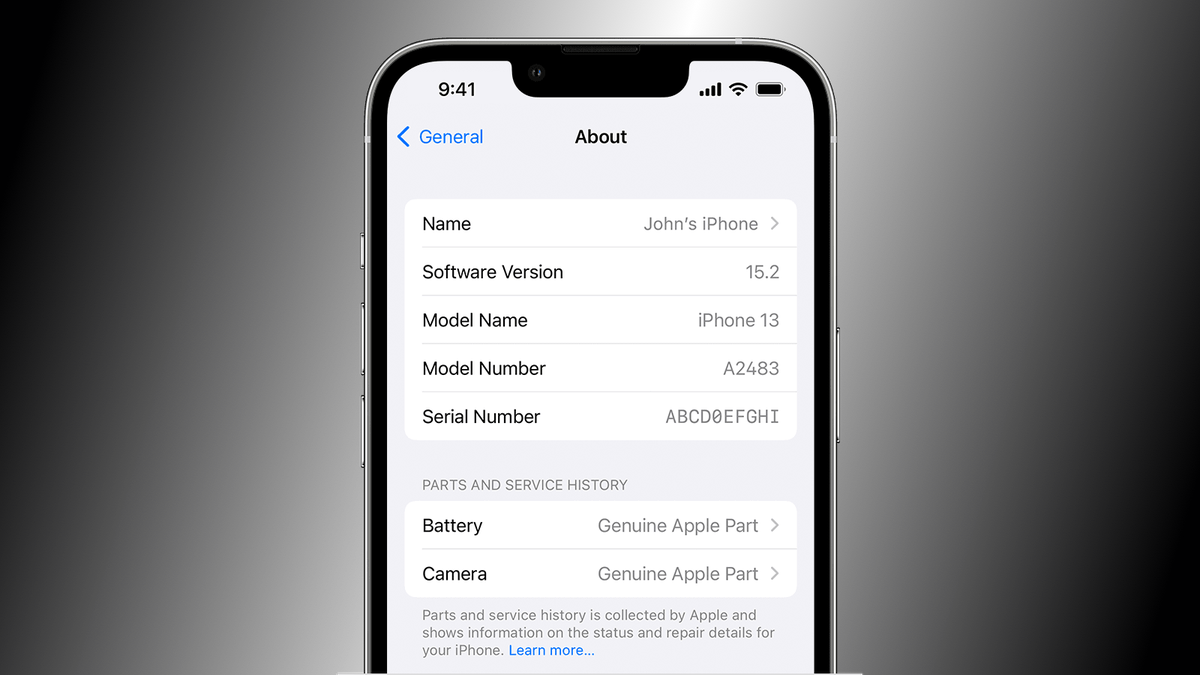TikTok Myth of the Week: Borax Is Good to Drink
I’m developing a theory that you can get anything to go viral on TikTok by mixing it into a glass of lemon water and speaking glowingly about its health benefits. This week, that something is Borax. Yes, the stuff...

I’m developing a theory that you can get anything to go viral on TikTok by mixing it into a glass of lemon water and speaking glowingly about its health benefits. This week, that something is Borax. Yes, the stuff you use in your laundry.
Creator after creator (they prefer this term now to “influencer”) is making the same video: They show a box of 20 Mule Team Borax to the camera, and explain that it will detox you, or balance your hormones, or relieve your arthritis. You just put a pinch, or maybe a couple of pinches, into a glass of water (lemon optional). Supposedly the stuff is perfectly natural, which means it must be good, and often we’ll get a little conspiratorial whisper about how Big Pharma doesn’t want you to know about its hidden benefits.
What is borax, anyway?
Borax is a mineral more accurately known as sodium tetraborate decahydrate. Chemically, it’s got sodium, hydrogen, and oxygen—all of which we commonly encounter in food and water—plus a few atoms of the lesser-known element boron.
In our diets, boron is what’s called a trace mineral. We get teeny tiny amounts of it naturally, and that seems to be enough. It’s not considered an essential nutrient—meaning, scientists are pretty sure we can live without it—but there is research suggesting it may be good for our bone health, metabolism, and other functions, according to the National Institutes of Health.
Note the difference at play here: Boron is an element that may be beneficial to our bodies; borax is the mineral that contains it. Borax is the one you can buy by the box in the laundry section of your favorite superstore.
Boric acid—yet another boron-containing compound—is sometimes used topically to treat yeast infections. Note that this is not borax.
(By the way, one of the world’s largest borax deposits is in California. An early mine, located in Death Valley, began operating before railroads reached the area. The borax ore was loaded onto massive carts that required 20-mule teams to pull them out of the valley and toward the railroad station, hence the name. But I guess it’s also a metaphor for how strong a cleaning agent it is, or something.)
Borax can remove stains from your laundry, kill insects, and make slime when mixed with glue. Borax is not intended for internal use.
Why are people drinking borax?!
Because it cures everything, okay?? In one morning’s scrolling I’ve seen claims that it helps arthritis pain, supports hormone function, enhances libido, relieves menstrual cramps, is beneficial for your autistic children, pulls nanotechnology out of the body, and is a promising cancer treatment.
Like ice water, it’s something easily accessible, and that any of us can whip up at home. (At least in the U.S.—borax isn’t sold in Europe.) Unlike the recent ice water trend, this doesn’t seem to be a marketing gimmick; people are actually arguing in videos and comments that ingesting borax is good for you.
This trend, like almost every “shockingly new” thing on TikTok, dates back to a much older myth. A document called “The Borax Conspiracy” has been circulating since at least 2012, claiming that borax is an arthritis cure and that Big Pharma is trying to hide that information from you. In actuality, the study on boron supplementation from the supposedly “silenced” scientist is available to read for free online, and the NIH cites it when discussing potential health effects of boron (not borax). They say that boron supplementation “might hold promise” for relieving arthritis pain, but that more research is needed.
Know your boron-containing products!
Boron supplements (3 mg) can be ingested if you would like to increase your intake of boron.20 Mule Team Borax is a laundry booster and multi-purpose cleaning agent. Heed the warning on the package and do not eat or drink this.What the TikTokers are getting wrong about borax
First of all, Borax’s advocates cannot keep straight whether they’re talking about boron or borax. Boron is the element; if you want to supplement it, you can do so with boron supplement pills like these. It’s considered safe to take a few milligrams of boron per day; the ones in that link provide 3 mg, which is a reasonable amount.
The next issue is dosage. When a white lady smiles as she adds “a pinch” of borax to her mason jar of water, that is a hell of a lot more than three milligrams. Borax is 11.5% boron by weight. That means a quarter-teaspoon contains 245 milligrams of boron, and even if her “pinch” of borax is just 1/16th of a teaspoon, that is still 61 milligrams.
The U.S.’s Food and Nutrition Board has set 20 milligrams as the upper limit for boron intake for adults. (It’s less for children, with the limit standing at 3 mg for toddlers and 11 mg for tweens.) The NIH notes that consuming too much boron can cause “headache, hypothermia, restlessness, weariness, renal injury, dermatitis, alopecia, anorexia, and indigestion” in addition to potentially more serious poisoning symptoms (some of these from massive quantities of boron ingestion) including nausea, vomiting, diarrhea, convulsions, depression, and vascular (blood vessel) collapse.
Concerns about borax toxicity have led people to question its safety as a cleaning product and as an ingredient in children’s crafts (like slime), which makes it all the more ironic that people are drinking it as a health tonic. Borax is considered to be safe when used properly, which means making sure not to ingest or inhale it.
Borax is also fun to use as a flux when melting gold, or to mix with alcohol and set on fire to make green flames. If you want to watch borax videos on TikTok, find one of for those.

 UsenB
UsenB 



























.jpg&h=630&w=1200&q=100&v=f776164e2b&c=1)




